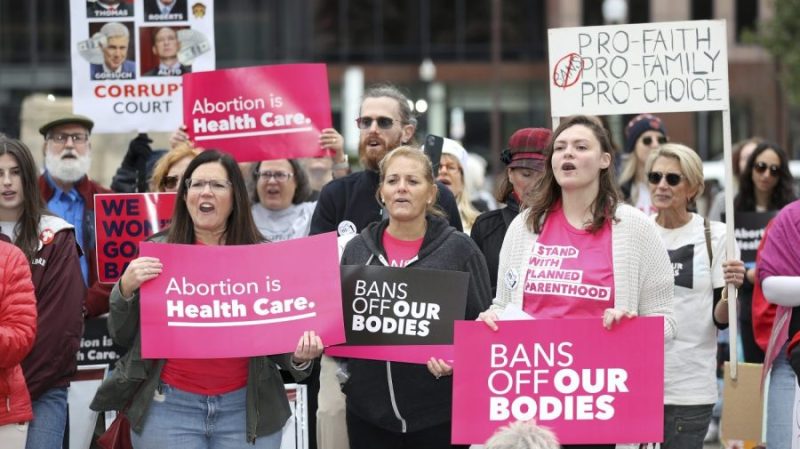Reproductive rights were broadly popular at the state level Tuesday night, as seven states passed ballot measures aimed at preserving, expanding or restoring the right to an abortion.
The measures won in blue states like New York and Maryland and in red and purple states like Montana, Arizona and Missouri — victories that could dramatically expand abortion access for millions of women. There have now been 14 states that have approved abortion-rights amendments since the Supreme Court overturned Roe v. Wade in 2022.
The measures won despite strong institutional opposition from anti-abortion advocacy groups, GOP politicians, judges and others who tried to stop the measures from even getting on the ballot in the first place.
But abortion ballot measures were defeated in Florida, Nebraska and South Dakota, a reminder that abortion rights remain a complicated patchwork across the country. Prior to Tuesday, abortion-rights amendments had never lost when they were on the ballot.
The amendment victories also show competing election priorities. Voters largely approved of local abortion protections, but voters in some of the same states voted for openly anti-abortion Republican senators. Voters in Arizona, Missouri and Montana elected former President Trump, who appointed three Supreme Court justices who helped overturn Roe v. Wade, but still largely supported abortion rights.
National abortion-rights groups said despite Trump’s victory, the message from voters on abortion was clear — even in Florida, where a majority supported a measure to protect abortion access, but it failed to reach the 60 percent threshold to pass.
“In poll after poll, voters said abortion mattered to them — mattered in their lives and mattered in the voting booth. In Missouri, Colorado, New York, Maryland, Arizona, Montana, Nevada, and Florida — the majority of voters were clear and unequivocal: people are dying. People are suffering. Fix this,” Alexis McGill Johnson, president and CEO of Planned Parenthood Action Fund said in a statement.
Red, purple state victories
Missouri was the first state to impose a near-total abortion ban after Roe was overturned, and last night it became the first state where voters paved the way to undo it.
The state currently bans abortion at all stages of pregnancy with one of the most restrictive laws in the nation. The amendment will allow lawmakers to restrict abortions only past the point of a fetus’s viability.
“Today, Missourians made history and sent a clear message: decisions around pregnancy, including abortion, birth control, and miscarriage care are personal and private and should be left up to patients and their families, not politicians,” Rachel Sweet, campaign manager of Missourians for Constitutional Freedom, said in a statement.
“This win is proof that Missourians are ready for a future where everyone has access to the health care they need,” Sweet said.
The measure won’t repeal the current ban; the next step is lawsuits asking courts to overturn laws that advocates say run counter to the amendment.
In Arizona, voters overwhelmingly rejected the state’s current 15-week abortion ban in favor of protections until fetal viability. Many Republicans and anti-abortion advocates had argued 15 weeks would be a popular “compromise.”
Nevada voters approved an abortion protection amendment, but they’ll need to do it again in 2026 before it takes effect.
Colorado also passed an amendment that aside from access, overturned a longstanding ban on using public funds for abortions. That means the state could start covering abortion for people on Medicaid and state employees.
Florida, South Dakota, Nebraska
The biggest loss of the night for abortion advocates was in Florida, where a more than $100 million campaign to undo the state’s six-week ban fell just short of the 60 percent supermajority needed to pass. As of Wednesday morning, the amendment had about 57 percent support.
“The reality is, because of Florida’s Constitution, a minority of Florida voters have decided that Amendment 4 will not be adopted,” Lauren Brenzel, campaign director for Yes on 4, told supporters Tuesday.
The effort faced a juggernaut of opposition from Gov. Ron DeSantis (R), who used state resources to challenge voter petition signatures, threaten local television stations for airing ads in support of the measure, and a state-sponsored website telling the public the amendment would “harm women.”
Opponents gave DeSantis credit for helping to block the amendment and indicated his tactics could be replicated in other states.
“Florida Governor Ron DeSantis deserves special recognition for taking the abortion industry head on and setting a new standard for what it means to be a Pro-Life Champion as a state’s chief executive,” said Carol Tobias, the president of National Right to Life.
The defeat means the end of Florida as the last haven for women who need abortions in the South, at least for now. With a six-week ban remaining in place, the closest states with looser restrictions are hundreds of miles away — North Carolina, Illinois or Virginia.
“Florida’s voters again had the choice — do we want to be like California? Their answer was ‘NO,’” Vote No on 4 spokesperson Taryn Fenske said in a statement. “Floridians’ commonsense, family-focused values prevailed.”
Voters in Nebraska meanwhile were confronted with two competing amendments that used similar language. They passed the measure that codifies the current 12-week ban, while leaving room for more restrictions.
In South Dakota, reproductive rights activists chose not to campaign for the measure, arguing it was not strong enough. The amendment would have legalized abortion in the first trimester, but lawmakers could have restricted it after 12 weeks.





